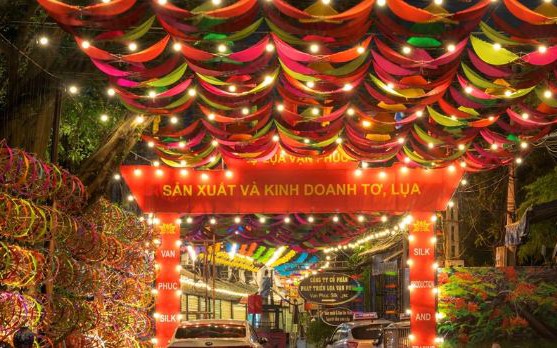The plan aims to develop a system of Cultural and Commercial Development Zones in areas with strong advantages, potential and available resources.

It seeks to coordinate and implement policies that mobilize investment and resources to create modern, civilized zones that reflect the unique cultural identity of each area.
The initiative also promotes the growth of cultural industries with competitive advantages within these zones, contributing to economic expansion, strengthening local branding, and enriching the cultural and spiritual life of residents.
By 2025, the city will conduct dissemination activities, training sessions, and evaluations to approve the establishment of one or two Cultural and Commercial Development Zones in existing urban neighborhoods, craft villages, or rural communities that already possess favorable commercial locations, cultural spaces, and heritage assets.
In 2026, one or two zones will officially begin operation, accompanied by priority investment projects to develop infrastructure, landscapes, and cultural business environments, while ensuring higher standards of security, order, food safety, and environmental protection than general city requirements.
By 2030, five to six high-quality cultural and commercial zones will be established, each representing a key area, helping build a creative ecosystem, improve living standards, and preserve traditional industries.
By 2045, Hanoi plans to form large-scale, comprehensive zones encompassing a wide range of cultural and creative industries that will serve as growth engines for other sectors, increase commercial and service revenues, and lay the foundation for Hanoi to become a globally connected, cultured, modern, and creative city.
Implementation Components
1. Promote and introduce models and activities of Cultural and Commercial Development Zones.
2. Provide training programs to develop high-quality human resources for cultural and creative industries.
3. Conduct studies to identify areas with strong potential and prepare dossiers for establishing development zones.
4. Implement incentive and support measures within the zones.
5. Attract investment resources.
6. Strengthen international cooperation.
7. Issue preferential policies for activities within the zones.
8. Monitor, supervise, and evaluate the effectiveness of these zones.
The People's Committee has assigned the Department of Culture and Sports to serve as the standing agency responsible for implementing support measures, providing information, communication, and promotion of the zones' activities.
The department will organize training programs, workshops, and domestic and international seminars on cultural industries and strategies to boost the performance of the zones.
It will support artists and artisans in passing down skills to younger creative professionals, identify and catalog potential areas for establishing new zones, and implement specialized measures to ensure effective management and operation.
Administrative procedures related to performance licensing, exhibitions, advertising, and press conferences will be simplified for cultural activities within these zones.
The People's Committee requires the plan to ensure feasibility and alignment with socio-economic and urban development planning.
It emphasizes balancing economic growth with the preservation and promotion of traditional cultural values.
The zones are expected to meet the recreational, shopping, and cultural needs of both residents and visitors, thereby stimulating tourism-related consumption and contributing to Hanoi's broader economic vitality.